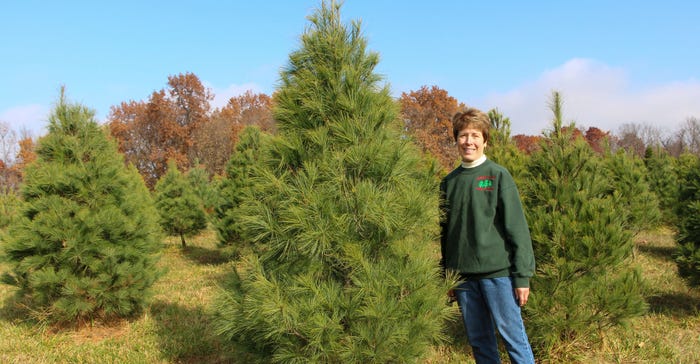
What is it like to operate a choose-and-cut Christmas tree farm during the COVID-19 pandemic? For Roy and Carol Freeman, it includes a few extra safety precautions and a lot of holiday spirit.
Christmas is not canceled at Christmas Ranch Tree Farm, Carol Freeman says. “We are open,” she says from her 1900s farmhouse-covered front porch near Excelsior Springs, Mo. “We are excited to offer a place for families to get out and enjoy the open air of the countryside this holiday season. We want families to carry on their traditions or make some new memories here at the farm.”
Freeman and her husband, Roy, have been welcoming visitors to their tree farm for 30 years. She admits this year will be different.
Safety is priority
“Opening weekend, we usually have horse-drawn wagon rides and Santa,” the retired nurse says. “And we’re not going to be able to do that this year.” She says wagon rides put people in too close of contact, and Santa is just a huge draw for little children. “I can’t tell them not to hug Santa,” she says, “so he will not be there. It is important that Santa remains healthy to deliver all the gifts this Christmas.”
Freeman was part of a National Christmas Tree Association committee, which developed best practices for choose-and-cut farms, along with tree lot operators. “The goal was to offer strategies that protect both our workers and customers,” she adds.
The couple adapted the association’s recommendations, along with restrictions from the Clay County Health Department, to develop their own COVID-19 plan. Workers at the Christmas Ranch Tree Farm will wear masks and gloves. Employees also will help sanitize equipment for customers.
As for visitors, everyone will be required to wear a mask. Families will have access to “clean” handsaws for cutting down that perfect tree. Unfortunately, visitors will need to tie down their own trees, but the supplies will be available on-site.
While social distancing outdoors at a tree farm seems simple, Freeman says there are a few areas where people like to congregate. “We usually have an area where people can sit in the barn with the heater and another around the fire pit in the front of the barn where they congregate,” she explains. “We’re going to spread that out and encourage people not to join together there in the barn.”
The larger space will be used instead as a checkout area, so visitors can easily social distance with all their purchases. The farm offers more than just trees. It sells wreaths, swags and ornaments.
No trip to the Christmas Ranch Tree Farm is complete without cookies, cocoa and hot cider. In a normal year, visitors would help themselves to the free goodies, but this year, staff will serve them. And, Freeman adds, all the cookies will be individually bagged.
Despite the changes, the Christmas Ranch Tree Farm will be open for adults and children to walk or run around in the fresh, winter air. “I think, especially at this time, we need time with our families and time outdoors,” Freeman adds.
Growing a tree farm
The farm, which was once a cattle operation, started in 1982. “We planted, and then a drought came,” Freeman says. “So our first few years were off to a slow start. It took a little longer to grow trees to sell.”
Today, she tends to about 16,000 trees across 20 acres. Freeman says the number is actually down from the peak of 20,000 in the early 1990s. “I’m retired now,” she explains, “so this is just the right amount to handle.”
The farm is home to six different trees — white pine, Scotch pine, Canaan fir, Douglas fir, Norway spruce and concolor. Visitors can choose from all but the concolor to cut this year. “It has a curly needle and orange smell. It is a real different fragrance,” Freeman says. “They take a lot longer to grow, so they are not yet a sellable tree.”
However, this year, the family is offering colored trees. “It is a hot trend of coloring trees pink, blue and red,” she explains. “We are going to try it and see if our customers like it.”
Managing the tree operation is a year-round job for Freeman, which starts in March and April with removing stumps from the Christmas buying season and planting new trees.
The following months include a lot of mowing. By June, Freeman is pruning trees into shape. It is usually a two-month process. Freeman works on all the trees smaller than 5 feet, while her husband tackles those larger.
The couple hires a crew to come and prune the largest Scotch pines. Then it is more mowing and upkeep until November when customers arrive.
Christmas Ranch Tree Farm opens the weekend after Thanksgiving every year. It is the time of year that Freeman absolutely loves.
“It is my favorite part of the tree operation,” she says. “I enjoy seeing generations come to the farm and pick out a tree for the holidays. It is fun to watch. They are excited.”
Despite COVID-19, Freeman says her farm will be one place where families can “make happy memories.”
Read more about:
Covid 19About the Author(s)
You May Also Like






